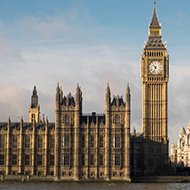Vets, Peers and MPs meet to discuss legislative reforms

The present Veterinary Surgeons Act was first enacted 60 years ago.
Veterinary sector leaders, peers and MPs have met to discuss legislative reforms designed to modernise the veterinary professions and make the sector more inclusive and accessible.
Representatives from the Animal Health and Welfare Board for England, Defra, the BVA and the BVNA attended the Legislative Reform Lunch in the House of Lords on Tuesday (28 June), hosted by the RCVS.
Sponsored by Professor the Lord Trees - the only veterinary surgeon serving in the House of Lords - the event gave the RCVS a chance to discuss the need for new laws from the perspective of the professions and allow guests to ask questions regarding the proposals.
Attendees heard from Dr Kate Richards, RCVS president, Dr Mandisa Greene, RCVS senior vice-president and Eleanor Ferguson, RCVS registrar and director of legal services.
The present Veterinary Surgeons Act was first enacted 60 years ago, and Dr Richards began the debate by detailing the significant advancements in veterinary practice that have taken place since then. She also outlined the updates to the proposed new legislation, including extending regulation to allied and paraprofessionals and enhancing the role of veterinary nurses to allow them to perform a wider range of procedures.
Next, Dr Greene outlined the potential to introduce regulation of veterinary practices, as an additional means of upholding veterinary standards. She said that any mandatory scheme would sit alongside the current voluntary Practice Standards Scheme (PSS), to which 68 per cent of practices are currently signed up.
Finally, Dr Ferguson explained that the current disciplinary process was no longer fit for the modern veterinary sector. She stressed that it should be updated to be based on a ‘fitness to practise’ model that focuses less on past misconduct and provides a wider, more flexible range of sanctions.
Dr Richards, said: “We want to thank everyone who attended our Legislative Reform Lunch and took part in the stimulating and engaging discussions. It was inspiring to hear the views of people who are passionate about animal welfare and interested in supporting our work to help modernise the veterinary professions through legislative change, making it fairer, more flexible and forward looking.
“The legislative reforms the College is proposing follow years of research, surveys, consultations and insight gathering from the professions. The proposed changes have been put forward to not only modernise the professions but also improve standards of veterinary care, to inspire a greater level of public confidence in the professions and to meet head-on the challenges the professions are currently facing, including workforce capacity.”
She added: “This event was a key stage in the process that we hope will form long and fruitful partnerships with people who share our commitment to upholding and championing standards of animal health and welfare.”



 The latest
The latest